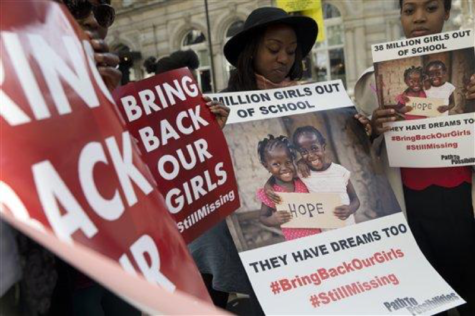Chibok Schoolgirls Released
May 25, 2017
After three years of negotiations a large group of schoolgirls, kidnapped in April 2014, was released on Sunday, May 7.
The girls were being held by Boko Haram, a terrorist group centered in Borno, Nigeria, who kidnapped them from a boarding school in

Chibok, Nigeria in April of 2014. An estimated 276 girls were forced into captivity in the middle of the night and loaded into trucks, according to BBC. However, 57 girls managed to jump out of the trucks and run away, leaving 219 to be taken to Boko Haram controlled land.
Previous negotiations between Boko Haram and the Nigerian government freed 21 girls in October of 2016, two years after their kidnapping. The latest negotiation to happen occurred on May 7 and freed 82 girls in exchange for five of Boko Haram’s top commanders, who had been imprisoned by the Nigerian government.
Originally, the negotiation arranged for the release of 83 girls, but one of them chose to stay with Boko Haram, citing that she wanted to stay. According to Garba Shehu, a presidential spokesman, the girl said she wanted to stay with her husband.
Boko Haram, otherwise known as Jama’atu Ahlis Sunna Lidda’awati wal-Jihad, was first founded in 2002. The group’s main focus is the opposition of Western culture and society. Acts such as voting in elections, wearing shirts and trousers or receiving a secular education are example of Western activities seen as forbidden to the group.
With a goal of creating an Islamic state, Boko Haram recruits children from schools they built as an alternative to “Western schools.” Poor Nigerian families enroll their kids into these schools, unaware that they would be used by the terrorist group.
The schoolgirls rescued on May 7 have since been transported to Abuja, Nigeria’s capital, with the help of the Nigerian government and the International Committee of the Red Cross. The ICRC pledged to continue helping the girls recover after they helped transport them from Boko Haram to the capital.
Jason Straziuso, a spokesman for the ICRC, said, “Our concern for the girls’ well-being will continue in the coming months.”






